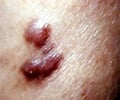The rapid evolution of HIV, which has allowed the virus to develop resistance to patients' natural immunity, is at the same time slowing the virus's ability to cause AIDS.

Both processes make an important contribution to the overall goal of the control and eradication of the HIV epidemic. In 2013, there were a total of 35 million people living with HIV worldwide according to the World Health Organisation.
The study, published today in the journal Proceedings of the National Academy of Sciences (PNAS), was led by researchers at the University of Oxford, along with scientists from South Africa, Canada, Tokyo, Harvard University and Microsoft Research. The research was carried out in Botswana and South Africa, two countries that have been worst affected by the HIV epidemic. Across those countries, researchers enrolled over 2000 women with chronic HIV infection to take part in the study.
The first part of the study looked at whether the interaction between the body's natural immune response and HIV leads to the virus becoming less virulent.
Central to this investigation are proteins in our blood called the human leukocyte antigens (HLA), which enable the immune system to differentiate between the human body's proteins and the proteins of pathogens. People with a gene that expresses a particular HLA protein called HLA-B*57, are known to benefit from a 'protective effect' to HIV. Infected patients with the HLA-B*57 gene progress more slowly than usual to AIDS.
This study showed that in Botswana, where HIV has evolved to adapt to HLA-B*57 more than in South Africa, patients no longer benefit from this gene's protective effect. However, the team's data show that the cost of this adaptation to HIV is that its ability to replicate is significantly reduced, therefore making the virus less virulent.
Lead scientist, Professor Phillip Goulder from the University of Oxford, said "This research highlights the fact that HIV adaptation to the most effective immune responses we can make against it comes at a significant cost to its ability to replicate. Anything we can do to increase the pressure on HIV in this way may allow scientists to reduce the destructive power of HIV over time."
Source-Eurekalert
 MEDINDIA
MEDINDIA




 Email
Email









